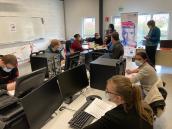Transport Industry
Headlines

A whole week of testing for future training technologies
From 22 to 26 March 2021, new learning tools were assessed under real conditions in the Hauts-de-France region as part of the Interreg BHC21, a project aimed at improving the training of tomorrow’s operators.
There is nothing like full-scale testing to assess the performance of novel tools! From 22 to 26 March 2021, as part of the BHC21 European collaborative project, eight young people were initiated into the professions of the metallurgical industry thanks to the new training technologies. This initiation took place at the Association for Professional Training in Industry (Association de Formation Professionnelle de l’Industrie) of Hénin Beaumont (Pas-de-Calais, France). During that week, plenty of practical learning activities were offered, between tests and scenario playing, and involved innovative technologies: smart configurable voice and video assistants applied to machining processes, augmented reality and virtual reality glasses to test the trainees’ ability to follow instructions and a logical process, and digital applications allowing learners to assess themselves and develop their soft skills.
International collaboration
“BHC21” (Boosting Human Capital in the 21st century) is a project supported by the European Union as part of the INTERREG 2 Mers programme. Its aim is to contribute to the implementation of more efficient and effective professional training services intended for low‑skilled people within the whole cooperation area, especially with the help of new technologies. This interregional project involves partners from Belgium, the United Kingdom and France (Cetim, Maison pour l’entreprise, l’emploi et la formation Santerre Haute-Somme and Sud Concept Hauts-de-France). It follows an ascending approach which starts from the needs at field level and brings together employers, professional training organisations, public employment services and low-skilled people in a collaborative creation process. The feedback regarding these practical applications will be issued and shared in the cross-border context of the project with a view to structuring the next work step, which will consist in designing a 12-week long training period involving apprentices, SMEs from the metallurgical sector and trainers. In the end, a complete training cycle relying on innovative technologies will be developed and tested.
To find out more on this project, visit the Interreg 2 Mers website.
Other informations
Video: Cetim takes up the challenge of metal additive manufacturing
Headlines
In a new video, Philippe Lubineau, Chief Research Officer at Cetim, talks about this key techno...
Hydrogen distribution: the results of the H2REF project are unveiled!
Headlines
The partners of the European project intended to develop an H 2 distribution station...
Scientific publications
- Galling detection by acoustic emission according to ASTMG98
- Thermomechanichal study of high speed rolling element bearing: a simplified approach
- Robust Active Control of The Milling Process Vibrations in a fixed reference frame
- 3D numerical simulation of drilling residual stresses
- Influence of the lubrication conditions on surface integrity in drilling
References
Comprehensive support for validation plans
( Sonceboz)In situ measurements for product validation
( Poma)Monitoring the clamp load of connections
( Alstom)Virtual reality a key feature in the manufacturing processes
( Sealver)Acoustic modelling for optimised vacuum trains
( Neu Railways)Results of studies
Material fatigue - Factors influencing the fatigue strength of metal of metal materials
JTC10 – Material efficiency – Summary of standards
Guide to Fatigue Design of Components and Structures
Residual Life of Structures and Equipment: Problems and Application to Cranes
Calculations and improvements in cleanliness measurement uncertainties. Granulometry section: theoretical studies and interlaboratory tests
Presentation
Prime manufacturers and subcontractors of automotive, railway or naval industries show great expectations towards mechanical engineering, which is offering a high potential for progress. The French reference in mechanics, Cetim is a support for your design and product's reliability studies, and makes available for your company its large resources in the fields of simulation, testing engineering, failure analysis and mechanical skills management.
.





